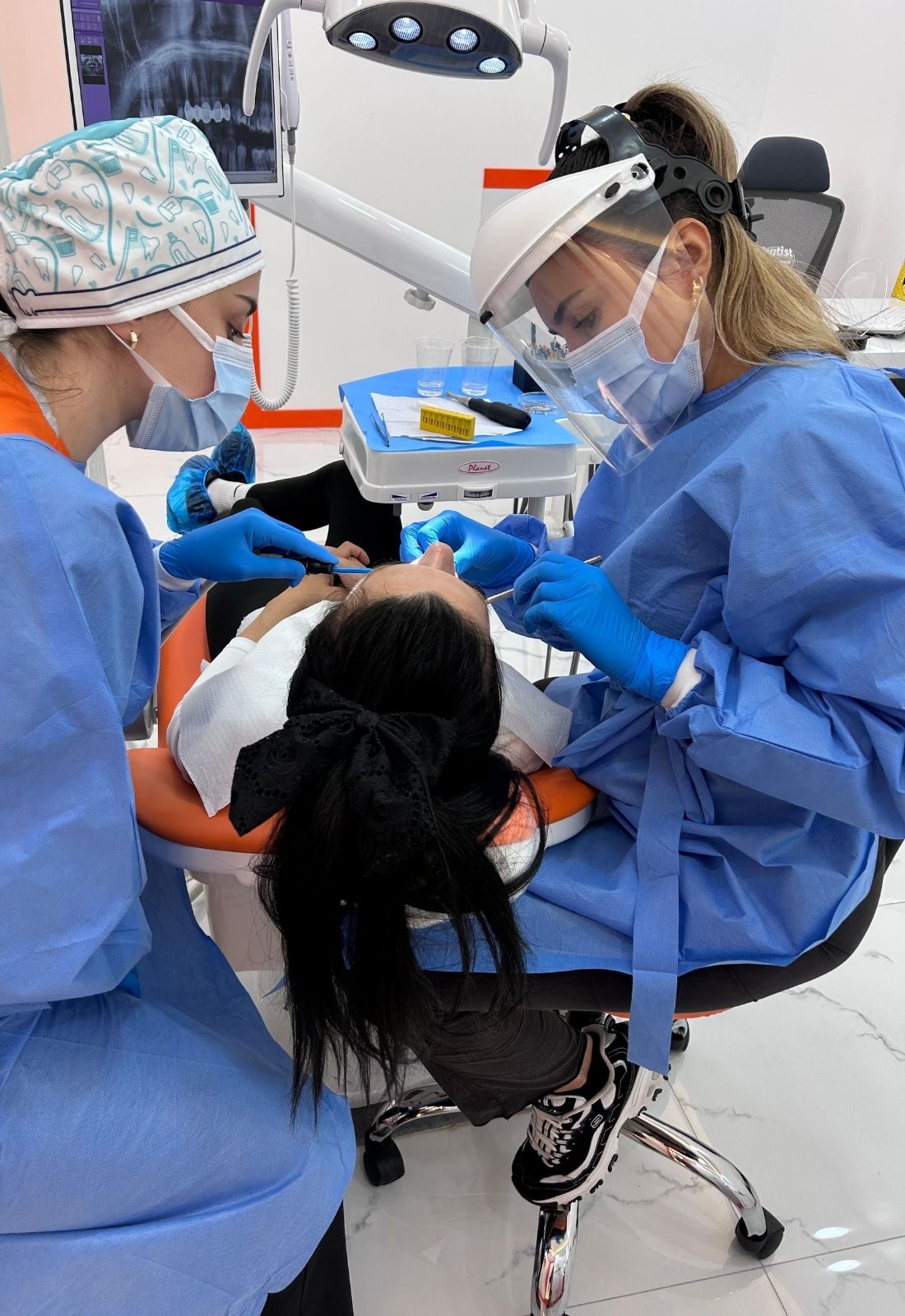
Pediatric Dentistry (Pedodontics)
Pediatric dentistry focuses on protecting the oral and dental health of children from infancy through adolescence. Minimally invasive methods such as the Hall Technique and silver diamine fluoride applications are used to manage cavities, while laser technology reduces discomfort during treatment. Biocompatible materials like glass ionomer cements enhance safety and effectiveness. In preventive care, fluoride applications and oral hygiene education play significant roles. Managing dental anxiety in children is addressed using behavioral and sedation techniques to ensure a comfortable treatment process.
| Preventive Treatments | Fissure sealants, fluoride applications | 0-14 years |
| Decay Treatment | Fillings, root canal therapy | 3-14 years |
| Orthodontic Problems | Braces, appliance therapy | 6-14 years |
| Trauma Treatment | Tooth replantation, fracture repair | 2-14 years |
| Primary Tooth Treatments | Pulp therapy, extraction of primary teeth | 2-6 years |
| Jaw Development Disorders | Use of functional orthodontic appliances | 5-14 years |
| Education and Habits | Prevention of thumb sucking, nail biting habits | 1-14 years |
| Sedation and Anesthesia | Dental treatment under general anesthesia, sedation | 2-12 years |
What is Pediatric Dentistry and Why is it Important?
Pediatric dentistry is a specialized branch of dentistry dedicated to preserving and treating the oral health of children from infancy through adolescence. It provides solutions tailored to the age-specific needs and behavioral differences of children, aiming for long-term oral health goals.
Key areas of practice include:
- Fluoride applications to prevent cavities
- Dental sealants for healthy tooth development
- Minimally invasive methods such as the Hall Technique and silver diamine fluoride applications
- Behavioral guidance techniques to reduce dental anxiety in children
Pediatric dentists use various techniques to alleviate children’s concerns and fears about dental care. The “tell-show-do” method, positive reinforcement, and distraction with visual-auditory tools create a supportive environment. This approach encourages children to attend regular dental visits and supports the development of healthy oral habits from an early age.
When Should Children Visit a Pediatric Dentist for the First Time?
Children should have their first dental visit by the age of one or within six months after their first tooth erupts. This initial visit is crucial for monitoring dental development and identifying potential issues early on. During this visit, parents are informed about preventive care and hygiene practices.
- Early childhood cavities
- Assessment of gum health
- Jaw and bite alignment
- Habits such as thumb sucking and bottle use
Early dental visits help children adapt to regular dental care and reduce dental anxiety. Dentists support the establishment of healthy dental habits throughout the child’s development and guide parents on preventive measures like brushing and fluoride use. Starting early ensures children become accustomed to dental visits and reduces the risk of more complex oral issues in the future.
How Does Pediatric Dentistry Prevent Cavities and Tooth Decay?
Pediatric dentistry offers effective preventive care strategies to prevent tooth decay in children. These approaches include regular fluoride treatments, application of dental sealants, and education on proper brushing and flossing techniques. These methods can be tailored and applied according to the needs of each age group, supporting children’s oral health effectively.
- Fluoride treatments
- Dental sealants
- Education on brushing and flossing
Dental sealants provide a protective barrier on the chewing surfaces of children’s molars, where cavities are most common. This thin coating prevents food particles and bacteria from settling in the grooves of the teeth. Fluoride strengthens the tooth enamel, increasing resistance to acid attacks and supporting the remineralization process.
Developing good oral hygiene habits in children not only improves their oral health but also reduces the need for more invasive treatments later on. Promoting proper brushing and flossing is a fundamental component of this process.
What is the Role of Nutrition in Children’s Oral Health?
Nutrition plays a fundamental role in children’s oral health by contributing to the development of strong and healthy teeth and reducing the risk of cavities. Minerals like calcium, phosphorus, and vitamin D are essential for tooth strengthening and the remineralization process. Consuming foods rich in these vitamins and minerals helps maintain healthy tooth structures.
Key tooth-friendly foods include:
- Milk and dairy products
- Leafy green vegetables
- Fortified grains and cereals
- High-fiber fruits and vegetables (apples, carrots)
- Nuts
Fluoride present in drinking water provides a protective effect on tooth enamel, strengthening it against decay. Foods that naturally clean teeth and neutralize acids also support oral health.
Sugary and starchy foods increase acid levels in the mouth, promoting cavity formation. Sticky and sugary snacks that remain on the teeth for extended periods can accelerate enamel erosion. Encouraging children to limit their intake of sugary snacks significantly reduces the risk of tooth decay.
What are Common Pediatric Dental Treatments?
Common treatment methods in pediatric dentistry are aimed at preserving children’s oral health and supporting their developmental processes. These treatments are crucial for controlling cavities, preventing tooth loss, and ensuring proper alignment of teeth. The treatments frequently applied in pediatric dentistry are designed to optimally support the child’s oral health and developmental stages.
Fillings
- Stop the progression of cavities by filling the decayed areas
- Composite resin fillings match the natural tooth color, providing aesthetic harmony
- Amalgam fillings offer durability and are preferred for molars
Crowns (Stainless Steel Crowns)
- Protect teeth with large cavities or damage
- Maintain tooth functionality and support proper alignment of other teeth
- Preferred for primary molars due to their durability and reliability
Space Maintainers
- Preserve space after the loss of a primary tooth until the permanent tooth erupts
- Prevent orthodontic issues by avoiding misalignment of teeth
- Available in fixed or removable options and securely fitted
Extractions
- Performed for severely decayed or damaged teeth
- Can be done for orthodontic reasons to reduce crowding
- Managed with local anesthesia and, if necessary, sedation to control pain

The Best Doctors Performing Pediatric Dentistry (Pedodontics) in Izmir
In Izmir, Pediatric Dentistry (Pedodontics) is not just about choosing a dentist; working with the best doctors directly impacts the success of your treatment. At AvrupaDent, we offer you the chance to choose from the best doctors performing Pediatric Dentistry (Pedodontics) in Izmir. Achieve a healthy and aesthetic smile with us.
Our Branches and Our Doctors
![]()
Health Group
As Avrupadent Health Group, we provide services in many districts of Izmir, especially in Buca and Gaziemir.
Frequently Asked Questions
The first dental visit for a child should be scheduled by the age of one or within six months after the eruption of the first tooth. This early visit is important for monitoring dental development, preventing potential dental issues, and establishing a positive relationship with the dentist. Subsequent check-ups are typically recommended every six months.
Treatment of primary teeth is important because it supports proper chewing, correct speech development, and acts as a space holder for permanent teeth. Untreated primary teeth can lead to cavities and infections that may affect the underlying permanent teeth. Early dental care also helps establish healthy oral hygiene habits, reducing the risk of future dental problems.
Preventing cavities in children involves regular brushing with fluoride toothpaste twice a day, limiting sugary foods and beverages, scheduling regular dental check-ups, fluoridated drinking water, and applying dental sealants on molars. Studies have shown that fluoridated water can reduce tooth decay in children by up to 25%, and dental sealants can prevent cavities in molars by up to 80%. However, the effectiveness and longevity of sealants depend on the materials used and the application technique. Resin-based sealants generally have higher retention rates compared to glass ionomer sealants. Regular dental check-ups are essential to maintain the effectiveness of sealants over time.
Fissure sealants are highly effective in preventing cavities, especially on the chewing surfaces of children’s molars where cavities are most common. Research indicates that fissure sealants can reduce the risk of cavities by up to 80% in the first two years after application and maintain their effectiveness over time. For example, a study showed that children aged 6-9 who received both fissure sealants and oral health education had an 83.65% cavity rate after 12 months, compared to an 86.62% rate in children who did not receive sealants. However, the retention and effectiveness of fissure sealants can vary based on the material used and the application technique. Resin-based sealants offer higher retention rates compared to glass ionomer sealants. Regular dental check-ups are important to preserve the long-term effectiveness of fissure sealants.
Establishing regular brushing habits in children is crucial for preventing tooth decay. Approximately 23% of children aged 2-5 and 50% of children aged 6-9 suffer from tooth decay. Regular brushing with fluoride toothpaste can reduce the risk of cavities in permanent teeth by up to 26%. However, brushing less than twice a day significantly increases the risk of cavities in young children. Parents play a major role as children often imitate their caregivers’ habits. Parents with good oral hygiene can positively influence their children’s brushing habits. Additionally, school-based brushing programs have been effective in promoting oral health among children. By encouraging early and regular brushing habits, children can significantly reduce the risk of dental issues and establish a foundation for lifelong oral health.

Contact Us,
Renew Your Smile!
To schedule an appointment, please fill out the form below completely and get in touch with us.


